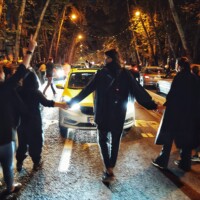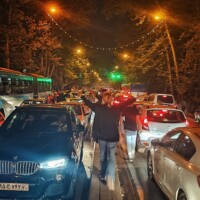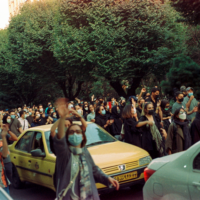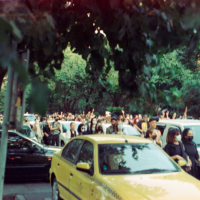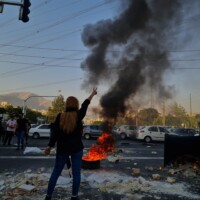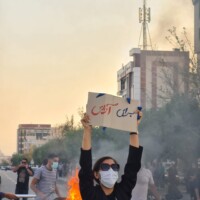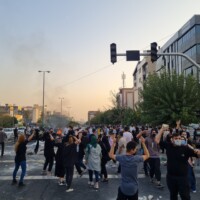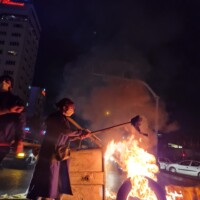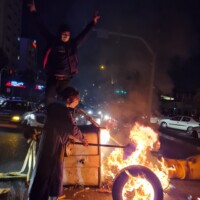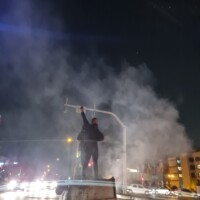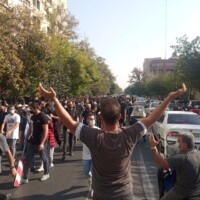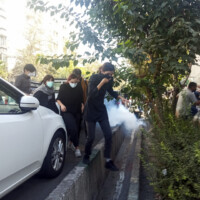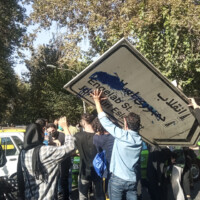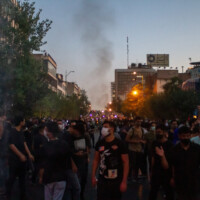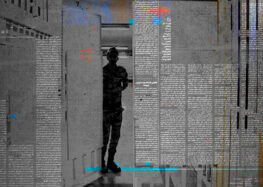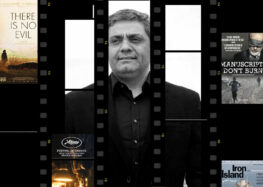Iran Protests: Voices from Iran (Updated)
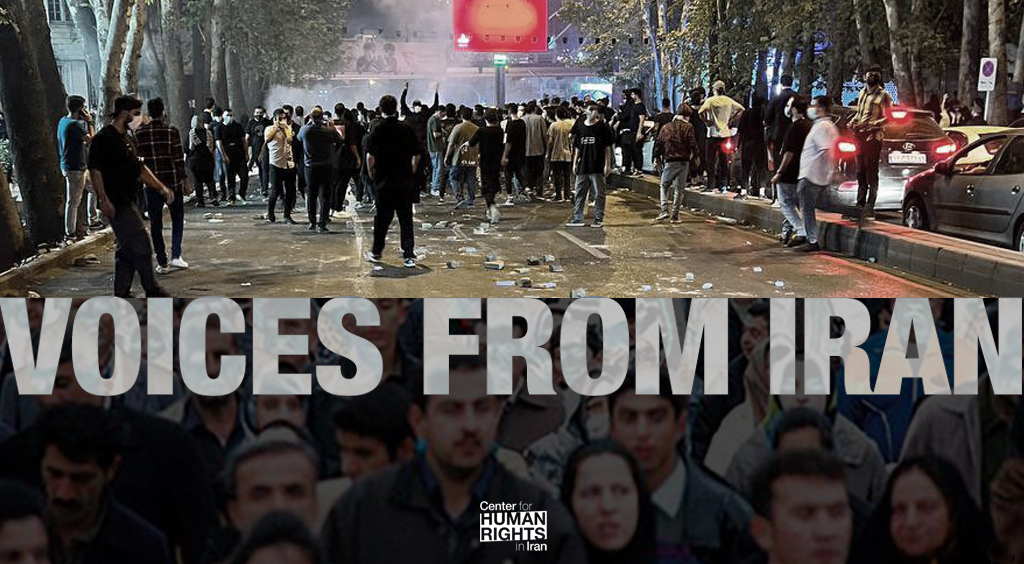 As nationwide protests continue to sweep Iran, there are very few direct voices from inside Iran reaching the international stage. An understanding of the fabric of the society and its rapidly evolving outlook and demands is essential for understanding the protests and what the international community should do.
As nationwide protests continue to sweep Iran, there are very few direct voices from inside Iran reaching the international stage. An understanding of the fabric of the society and its rapidly evolving outlook and demands is essential for understanding the protests and what the international community should do.
Our team at the Center for Human Rights in Iran is in daily contact with Iranians throughout the country. In regular updates posted below, we will be publishing what we are hearing from Iranians from all walks of life.
September 16, 2024
Excerpts from our conversations with brave photographers who documented Iran’s Woman, Life, Freedom movement.
Photographer A:
“When I wanted to take photos or document the events, I would sometimes record videos and send them, but I couldn’t keep them because it was such a terrifying atmosphere. Once they were shared, I would delete them.
“We had put some lemons in our bags to pass around so that when tear gas was fired, people could squeeze them into their eyes to neutralize the effect. In my own bag, I had also put goggles in case they shot at us with rubber bullets so that they wouldn’t hit my eyes. We had prepared ourselves like this to go out.
“No one had weapons; our only weapon was our mobile phones, capturing and sharing images.”
Photographer B:
“During the Woman, Life, Freedom movement, I took to the streets of Tehran as both a protester and a photographer. My time there only lasted for the first five days, but during that short period, I managed to capture two rolls of film. From the very beginning, the protests were met with the regime’s usual brutality. It was unrestrained, raw violence with a single aim—to scatter and silence any voice that opposed the government.
“Hearing the chants of “Death to the dictator” and capturing those moments through my lens was the most memorable thing that shall stay with me forever.
“Tear gas, baton-wielding police, and the deafening roar of motorbikes became inseparable elements of the protests. One of the most surreal moments was when strangers would blow cigarette smoke into each other’s faces to neutralize the effects of the tear gas—it felt like giving someone their breath back.
“The moment of my arrest was one of pure surrender. At 7 a.m., they stormed my workplace, arresting me. Shortly after, they raided my home, seizing my cameras and equipment. Hours later, I found myself in prison, being interrogated.
“The worst moment of the protests was hearing the sickening sound of a young man’s face being crushed under the blows of two plainclothes officers. They hit him with the butt of a rifle—completely unnecessary, probably done out of sheer enjoyment.
“The best moment of the protests was when we, with nothing but our bare bodies, drove a large group of motorcyclists back. Our bodies were the only weapons we had, but together, we made them retreat.
“I was arrested on the fifth day of the protests and spent fifty days in prison. Six months after my release, I managed to leave Iran. The memories of prison and what my family and I endured are too vast to capture here. But those fifty days were a daily battle—to keep from losing hope, to keep going, to hold onto the reasons we took to the streets in the first place. It was a struggle to protect my comrades, to not give away any names, to hold on to my spirit, and to keep the hatred for our real enemy alive.
“I believe the Woman, Life, Freedom movement accomplished two things. First, it awakened a sense of justice in a generation that had never had the chance to express itself. Second, it exposed those who claimed to oppose the Islamic Republic but couldn’t organize a resistance force for even a few months. It also shifted the mindset of the older generations, revealing the true face of the regime to the more religious sectors of society. As one friend put it, if seeing a 12-year-old child shot in the head with a military weapon doesn’t awaken your conscience, then nothing else will.”
Photographer C:
“The most memorable moment for me was when a chain of about ten women, most of whom were over thirty, held hands and blocked an intersection in protest. It was a powerful image, and it struck me deeply that, this time, women were leading the charge while the men were supporting them. That was truly the most beautiful moment of all the events for me.
“On the other hand, my worst experience was after three months when one of my close friends was released from Evin Prison. I witnessed firsthand the physical and mental scars they bore. They would wake up in the night in terror, screaming, unable to find peace. It was heartbreaking to see the pride and bravery from before overshadowed by the trauma and suffering we were left to deal with. In the end, the aftermath of those days was more painful for me.”
Photographer D:
“The first thing I could do on all the days I was at the protests was to help and stand by the people, and then take photos. That means if, in a moment, something happened to someone—if they were arrested or injured—I wouldn’t take photos, I’d go help because saving a human was much more important to me than capturing that image. Yes, I am a photographer, and I was supposed to capture it, but I feel like saving that person had a far greater impact on my life than taking that photo. No matter what would happen with the photo, even if it became famous or won awards. But at that moment, saving a life was much more important to me.
“After I was released, a significant event was that I saw many girls freely wearing what they wanted and being in the streets as the protests continued. It was good to see that people were not regretting their actions, despite the harsh sentences given to them. Everyone who had been in prison and was later freed remained resolute, and their courage was inspiring. However, a personal downside was feeling much more isolated compared to before. I found it challenging to find work, return to my previous job, or resume photography, as I was unable to pick up the camera again.
“What my interrogator told me was, “We will make you regret this so that you can’t work anywhere or establish any connections.” I don’t know if this was all planned or if they had predicted it, but everything they said came true. I experienced severe depression for a while, and on top of that, due to the illness I had and the medications I was taking, my body had become very weak. A new illness had also appeared, and unfortunately, two of the femur bones in my pelvis had turned black. I needed surgery as soon as possible, but I had no income and no financial support, which made it very difficult for me. Despite all this, I remained determined to resume photography, to return to the streets, to show the realities of society, and to continue fighting against this regime.
“But I lived for survival, I lived for victory, and I lived to show that victory. Even now, I still have that hope, and I’m certain we will achieve it. I am doing everything I can to be there on the day, the day of victory, when I can capture that photo because it is our right. We, the people, have the right to be free. We have the right to think about victory in our fight against this regime, and I hope that day comes soon.
“Those who have fallen into the trap of this Islamic Republic and ended up in prison, we have seen the end of the Islamic Republic. The end of the Islamic Republic is either to throw you in prison, kill you, or prevent you from working and put pressure on your family. Everyone who has been imprisoned or arrested has seen all this.”
Photographer E:
“When the ‘Woman, Life, Freedom’ protests began, I noticed that many experienced journalists and photographers had been detained and were now confined to their homes. This motivated me to take my own camera and start photographing, despite my inexperience in documentary photography. I tried to overcome my fear and capture everything I saw.
“During the protests, like everyone else who participated, I came close to being arrested several times. I was directly hit by a tear gas canister once, and when the smoke cleared, I couldn’t see anything. A few people helped me, and we went into a house where I took a photo of a young man receiving first aid from a woman. On the day of Nika’s memorial, I was hit by a pellet in the face.
“After the protests, facing the reality of continuing under the oppressive regime, despite all the fighting, deaths, and the blinding of my fellow citizens, was a profound grief that still affects me. It wasn’t just me; many in our community felt hopeless and fell into depression. Over time, we tried to pull ourselves together because that hopelessness is what the regime aims for—to create a depressed society that cannot make decisions or take action.
“I knew I had to keep going. I believe we can’t just sit idly by. Every day this regime remains in power, it causes harm that will take years to remedy, and some damages may never be repaired. Nevertheless, everyone must resist injustice in their own way. My tools are photography, filmmaking, and writing. Even after the protests, I haven’t stopped. I continue to take photos, make films, and write.”
February 13, 2023
Excerpts from our conversations with 12 teenage girls and young women in Iran, who spoke on the condition of anonymity:
“A,” 16, high school student
“A,” 15, high school student
“B,” 20, from Mashhad
“F,” 18, from a low-income religious family, father is against her seeking higher education
“D,” 19
“G,” 16
“K,” 17
“N,” 19
“S,” 17, Afghan national, born in Iran
“S,” 18
“D,” 18, Student, theater actress, from a religious family, father is a pro-regime manager in a government office
“T,” 19, from a religious family
On wearing the hijab: “Saying “No” to forced hijab has become a symbol that says we’re still alive, it says we’re still striving to bring change.”
A (16): I don’t wear the hijab. I’ve never worn it, so now for sure I’m not wearing it. A lot of young people have died for the sake of us girls, so that we won’t have to wear the hijab, so that we could live freely, with or without the hijab.
A (15): Since the start of the protests, I haven’t worn the hijab. The mandatory hijab is what ignited these protests in the first place. Saying “No” to forced hijab has become a symbol that says we’re still alive, it says we’re still striving to bring change.
B: It’s none of my business if someone wants to wear the hijab or not. In Tehran, a lot of people aren’t wearing the hijab. When I went out without a hijab there, I didn’t sense any fear. Nobody smiled in encouragement and nobody gave me a bad look. But when I came back to Mashhad, it’s very different. I’m the only one without the hijab and the sense of fear is there. Some people smile and thank me for having the courage to not wear the hijab. [On the other hand] I went to the supermarket today and the guy said, “Miss! Please wear the hijab,” and I said, “No, thank you” and came out of the store.
F: I do wear the hijab. My generation, born after 2000, has lived in a society where the hijab has been mandatory and in some ways, we’ve gotten used to it—until these recent developments happened and my generation poured into the streets for this revolution and for making the hijab a matter of choice. When I’m with a group of girls, or even boys, who share the same tastes, my scarf might slip off my head but I don’t go out on the street bare-headed because we’re worried about safety. As long as the Islamic Republic still exists, our life will be in danger if we go out like that.
D (19): Since a couple of months ago, I see that people have become more fearful and they are wearing the hijab even tighter than before. The reason is that on most streets there are cameras that record people in their cars and issue fines for not observing the hijab. Just last night I was at a restaurant and 12 plain-clothed agents came with their walkie-talkies and took the owner to the side and told him not to serve customers who don’t have the hijab. They also gave us warnings, even though we were wearing the hijab. They identified our car and registration and immediately we received a SMS that said we had violated the hijab.
G: I believe people should show their opposition to [mandatory hijab] in any manner they can. As a young person, what I can do is not wear the hijab, especially in public. I think this is a very good development because it shows that our voice has been heard, and we’ve forced the regime to retreat. But we can’t be without the hijab in a lot of public places or else we will be denied services, like taking the metro, getting on a bus or going to the park.
K: I don’t wear the hijab in public spaces at all. Right now, a lot of women in Iran don’t wear the hijab, even in religious cities like Qom. In this way, I show my support for freedom and my solidarity and sympathy with the people of my country.
N: I haven’t worn the hijab in public areas since the protests started. I was already not wearing it in my private life, before the protests. We see a lot of women and girls on the street who aren’t wearing the hijab. You feel you’re not alone. Taking off the hijab is not just about the hijab itself, but a message that protests are continuing.
S (18): I don’t wear the hijab in public. I just throw a shawl around my neck because as an 18-year-old girl I can’t fight with anyone who might bother me on the street. I, like many other girls and women, am tired of bullying and dictatorship. If these protests had not started, I might have stayed in the dark about a lot of things. About how we are denied basic and fundamental rights in so many areas of life and facing so much discrimination and inequality. About how my youth, energy and dreams are being crushed and destroyed by a bunch of rotten brains. So, out of respect for all the blood that has been spilt, we should not wear the hijab.
D (18): I have not worn the hijab at all since the protests started and now I’ve gotten completely used to it. This makes me feel really good. I feel I’m taking a step for this revolution, and it might encourage others to go out on the street without the hijab, too.
T: I have not worn the hijab since five months ago, except in places where I feel a little scared and even then I only wear a hat or a shawl. Wearing the hijab is a matter of personal belief. Now that we are in a struggle, we should take a clear stand; it would be a good thing not to wear the hijab on the street.
On whether the protests will continue: “There’s been a fundamental change in our mind. This society cannot return to what it was.”
A (16): This movement will continue and we will have a revolution. I’m sure of it.
A (15): These protests will go on. We’ve destroyed and built some things. At the very least there’s been a fundamental change in our mind. It’s impossible to go back and be the same as we were…this society cannot return to what it was. From now on, we’ll speak out on every issue. We’ll express our opinion on every incident, even if we’re suppressed. I don’t know how long these developments in Iran will continue or when the revolution will succeed, but it’s going in that direction. It may have become less visible but it certainly hasn’t, and won’t, come to an end.
B: [There are] people who think nothing will come out of all this, or that there’s only a very small chance for change. But people like me are still hopeful, because I don’t want to live in this Iran when I’m 30. I don’t like not being able to make my own choices.
F: Yes, the protests will continue. Whether it will result in change or a revolution, depends on us, the people, on what percentage of the people are against this regime. If we join hands and stand together, we can bring about change. If the majority of the people stand against the regime, yes, it’s possible to have another revolution and a different regime. This regime has been around for many years. It’s very strong. It’s got a lot of divisions and sub-divisions. It’s not that easy. We won’t get anywhere with just a few days of protests by less than half the population.
D (19): We were very disillusioned after the executions. People are afraid and things have normalized to a great degree. Everyone has gone back to their regular lives. It’s very sad. Nobody honks their horn and we don’t hear anyone chanting. I think people have lost hope; they’re tired. Nobody is hopeful about any change happening. The truth is that we’re very afraid. We’ve seen our friends being arrested and abused. We’ve seen a lot of people killed. There are a lot of prisoners who haven’t been freed. We haven’t gotten anywhere. We wonder what was the purpose of so many people being killed? Why hasn’t anything changed? Things are getting worse, goods are getting more expensive. The authorities are becoming stricter. What was it all for? When will things improve? What else can we do?
G: These protests must absolutely continue. We can’t tolerate this much bloodshed again. We can’t cry and be so sad again. We have to finish what we started—and this will happen soon. I think if we don’t do this now, we’ll never be able to succeed because it will embolden the regime to treat us in the worst way. We shouldn’t let them, we have to have a revolution in this year.
K: The demonstrations in Iran will continue. They have not ended by any means. We will not stand by. We will continue because we want freedom. Women in Iran have no freedoms at all. And it’s very difficult for them to get a passport and leave the country.
N: I believe these protests will continue, maybe more scattered, or in different forms. They might not happen day after day like the past few months, but they will definitely show up in different ways because nobody’s blood will be spilt in vain. History shows that those who struggle and care will always achieve victory one day, even if it takes years. I was very hopeful that the revolution would succeed quickly but now I’m not that optimistic about it happening anytime soon. It could take longer.
S (17): I’m sure the protests will continue and certain things will change. When the people’s voice reaches the world, something will happen for sure, nothing will be the same.
S (18): Whether it will be two or ten years from now, this tyranny will eventually end and we will see a free Iran. The number of young people killed is not small, and with every death, the people’s hatred of this regime will grow further. To the same extent, the unity among the people will become stronger. I see the defeat and destruction of the dictatorship in my compatriots’ astonishing bravery.
D (18): The continuation and victory of the revolution depends on unity and solidarity among the people. I believe if all the people unite, they will definitely achieve their goals. If we all stand together, if none of us takes a step back, if we show greater and greater courage, we will certainly gain what we want—that is, a revolution.
T: Deep in my heart I’m sure the protests will continue and result in change. When you study the history of all the different countries and civilizations, you see that these developments are a common occurrence. I have no doubt that the revolution will happen, but maybe not very soon. By the time it happens, I might be an old person, but I don’t think it will take that long. This has been the natural political course in every dictatorship.
On the desired future for Iran: “I hope in Iran we gain the awareness that there’s only one divine religion and that’s “humanity.”
A (15): I want freedom in Iran, I want equality, I want everybody to be able to say their opinions, a good democracy.
B: Even though I’m hopeful about this revolution, it’s hard for me to imagine an Iran after the transformations because I don’t have any awareness of what freedom is or what a free Iran should be like. I don’t know how things will turn out. Until then I will try to improve my skills and better my education and do anything necessary to help Iran after the change. Since I can’t be like those courageous people who go out there and chant slogans and put their lives on the line, at least I’ll be useful to Iran after the change.
F: As for the future, I want a tranquil Iran, where nobody is guarding against anything, to be brothers and sisters, without any discrimination, or any thoughts about differences between this or that group of people. We don’t want to wake up every morning and see prices have gone up again. Whatever happens, I hope we’ll have a happy and joyful Iran. We Iranians are looking for peace and happiness, to have progress alongside our loved ones and a successful life.
D (19): After the change, we want our country to have stability in every way. My future, the future of my generation, is up in the air. We can’t imagine having a future here because we know we can’t grow here. It’s very sad that in order to grow and have a future, we have to go to another country. We want to be in our own country, where everything is okay and balanced. Every day we wake up and things are worse than the day before; more expensive, more unsafe, more theft and corruption. We have no hope in this country.
G: What I want from a future Iran is equality. I want equality for all human beings. There should be no difference between me as a girl, and a boy, no difference between me and LGBTQ kids. We all have the same rights. No one should make decisions or preach about someone else’s body. Nobody should be denied rights or rejected from society because of having certain traits.
K: I want a lot of things to change in Iran, especially freedom for women, and for young people my age, in our country, where we belong. We should have freedom and build the best life, in our own country.
N: What I want from [a future] Iran is a healthy economy. I want the kind of conditions where a 19- or 20-year-old could go to university, study and improve their life, and not be preoccupied with hardships and trying to earn enough for a loaf of bread! We want to be able to plan for our future without everything being in the air. We don’t want to think about whether we’ll be alive in a year or not, and what kind of condition we’ll be in. We don’t want the authorities to worry about who’s wearing a hijab and who’s not. Their main concern should be the people’s welfare and creating jobs for young people. Officials should [establish the conditions] for young people to find a job and make a living after they finish their studies; to give them hope for building the kind of life they want. And [I want] freedom, for all of us to be able to live together. Others should not be judged because of their religion. We should not accuse others and look at them with hate as they pass by, without having knowledge about each other.
S (17): My wish after Iran becomes free is to [have the same rights] as Iranian citizens. Ethnically I’m an Afghan, but I was born here in Iran. I want to have a birth certificate like Iranians do. We Afghans have a lot of problems in Iran, even over small things. For instance, we have difficulties enrolling in school; we have to go to a thousand places to get permits and in the end, we still might not succeed. It’s really hard to get a driver license and usually it’s only for a year. I don’t want to experience these problems anymore. I want everything to go smoothly, just like it is for Iranian citizens. We don’t want all this discrimination.
S (18): Honestly, I think a lot about what a free Iran would look like but I can’t get a clear image. Even if the conditions weren’t perfect, it would be a lot better than what we have now. In any case, it will be hard to change the culture of the past forty-something years. There may be some people who oppose the current regime but have backward and warped minds that are hard but not impossible to change. As an Iranian I want my country to have everything. I don’t want to look beyond my country to have a normal peaceful life. Finally, we should all be ourselves, and live any way we like, without fear of being judged. I hope in Iran we gain the awareness that there’s only one divine religion and that’s “humanity.”
D (18): After Iran is free, the most important thing I want is peace. As an 18-year-old girl, I want to feel safe walking on the street. I don’t want to feel danger all the time, to be worried that someone’s behind me who wants to hurt me or harass me. I know it will take a long time before we see peace after the revolution and I know it won’t happen overnight but we will definitely get there, if we all unite and believe in teamwork. Another issue is women’s rights. I want to gain all the rights that have been denied to me as an 18-year-old [woman]. I want to experience how equality feels. It’s important to me to get my trampled rights as a woman and comfortably live the rest of my life. I want to carry on the resistance as a member of this revolution. I don’t want to do nothing and regret it. I must do something for the victory of the revolution.
T: We have to look at [expectations for a future Iran] from different angles. The first thing everyone wants is a stable economy, because people’s livelihood is tied to everything else. We have to work on popular culture. A good government has to change the culture with constructive laws. It should get rid of superstitions, but not like when women’s hijab was forcibly removed under Reza Shah’s dictatorship. It has to have a real impact on people’s culture, so that in the future a bunch of religious people won’t overthrow a democratic system. Our education system has to be reformed to correct years of mistakes. Our art scene is hanging by just a few threads [and] a handful of artists. It’s important to pay more attention to the southern and western regions of the country that have been impoverished for years. I would also like to see civil rights. Environmental destruction has to stop. There are thousands of mistakes that need to be fixed.
February 14, 2023
“I don’t believe the regime is strong enough to silence the people… the revolution has already happened in the minds of the Iranian people.”
“S,” a 35-year-old girls’ school principal in Mashhad told us, “I don’t believe the protests have died down. I don’t believe the regime is strong enough to silence the people. The streets are just one part of the protests. Revolutions go through different stages, from the streets to the universities and then among the merchants and each day it shows itself in different ways.
“It’s true that what we see today is not like before, when all of us went into the streets. Demonstrations get a lot of visibility. But people might not notice the protests going on in the universities and among the merchants, pensioners, teachers, and those with disabilities.
“The bravery we see among the people didn’t happen overnight. We have a lot of pent-up anger from years of pressure; we’re just waiting for a spark. The rulers don’t have the strength to suppress the people.
“When I go for a walk in Mashhad or Tehran, I can clearly see the change in people’s faces. Something has been branded into our brains as a result of the recent developments. I might be at work chatting and kidding around with my coworkers about the events, or at the salon getting my nails or hair done, or at a party with my friends, or at a get-together at a friend’s house, but wherever I am I notice we all have common issues.
“The uprising, the killing of all these young people, the executions, imprisonments… none of this will be forgotten. The revolution has already happened in the minds of the Iranian people. However, we can’t say when the regime will give up or when the world will come to help us.
“The school kids are the ones who give us encouragement. They don’t wait for anyone. This [movement] has become so ingrained in them that they don’t think about anything else. Day by day they become more determined.
“The officials issue orders to our schools, send inspectors and display strange behavior but the students understand what’s going on. They don’t give a damn. They are going forward, more determined. They give us hope. They’re more hopeful every day.
“Iran hasn’t been our country for years. It’s like we’ve been held against our will, like criminals. Whatever we do, we have to be punished in accordance with the laws of the country. So we have to carry on living in secret.
“When change happens in Iran in the next few years, I don’t want to be treated like a criminal in the country I was born in and belong to. I don’t want to live in fear. I want the people who are running the country to be like me. What we want is not out of the ordinary. Everyone should live in relative prosperity.
“One of the things that has happened as a result of this uprising is that everyone feels the same. For instance, my religious friend and I share the same feelings right now because she’s upset too about the executions, she’s upset about those who’ve been tortured too, she’s upset about the economy, too.
“In fact, the problems created by the Islamic Republic have even affected those who proudly voted for Raisi in the last elections. We’re all in the same boat now. Everyone is preoccupied with this movement. And I think it will come to a result. I’m very optimistic. I haven’t lost hope even one bit despite the ups and downs and the joys and sadness.”
February 14, 2023
“Nobody believes that the movement has stopped; everyone more or less feels that more waves of protest against the Islamic Republic are on the way.”
“T,” a 40-year-old man from Tehran, told us, “At this point, the government has been able to contain the protests, in the most violent way possible, by shooting [demonstrators] in the street, torture, imprisonment, heavy sentences, threats, and of course the closure of the internet. For now, it has been able to empty the streets and return to normalcy.
“But the struggle is not over. Not at all. Almost everyone here knows that the street is the most important battleground against the Islamic Republic, but it’s not the only one. Therefore, the struggle continues. People are talking about it and about the methods they should use to carry on the struggle, they’re thinking about it, and regrouping. It isn’t over for anyone. To the contrary, the events of the past four months have been the beginning of an all-out struggle until the downfall of the Islamic Republic.
“Nobody believes that the movement has stopped; everyone more or less feels that more waves of protest against the Islamic Republic are on the way.
“The movement has created a lot of optimism. No one knows when and how change will come. Nevertheless, there’s a new opening. It’s as if everyone woke up from a dream. Everyone feels that life will never be the same. The developments have changed people’s perception of the future. People are now contemplating an Iran minus the Islamic Republic. The struggle hasn’t ended precisely for this very reason. There’s still hope.
“People are talking and joking about what they will do the day after Iran is free. There are a lot of people whose friends and relatives have left the country and are now thinking of coming back when things change. Things have changed forever. Hope is alive and very real. It might go down at times, or go up at other times but the hope of seeing the end of the Islamic Republic is the biggest hope Iranians have these days.”
Nov 22, 2022
Excerpts from our conversations with two girls and two young women in Mashhad, Iran, who spoke on the condition of anonymity:
“S” 17, High School Student, 11th Grade
“N” 17, High School Student, 11th Grade
“M” 21, University Student, Dentistry
“J” 22, University Student, English Language
On the Protests: “We only think about finding new ways to fight and protest so that our voices are heard by more people”
These past two months have been the best days of my time in school, especially since students joined the protests… Everyone is indeed worried, and many parents don’t allow their children to participate in the protests. But for me and many of my friends, there have been days when we feel proud and strong. I’m sure our revolution will be victorious!
N: Despite being worried, many parents join us in the street protests. Compared to the early days, I see more parents and children in the streets.
M: Many university students, especially new ones, were ready to protest and go on strike and generally join the people’s movement. Mahsa’s murder ignited all this hidden energy. Almost no one is in university classes right now. Everyone is getting ready to protest. In my opinion, this is not a student movement, but a complete revolution, with a clear goal: The departure of the Islamic Republic.
J: I’m not a political person at all. For example, when I listen to the political lingo from commentators who try to explain the protests, I don’t understand much of what they’re saying. The students, my classmates, we don’t talk like that amongst ourselves. We only think about finding new ways to fight and protest so that our voices are heard by more people.
On the Hijab: “All of us are pretty sure that the mandatory hijab is a matter of life or death for the Islamic Republic. For this reason, we shouldn’t back down”
S: I think the compulsory hijab doesn’t exist in Iran anymore. I see many people who used to wear a headscarf on the street, but now they don’t. Or my father, for example, used to be sensitive about the hijab but isn’t anymore. When he sees a girl without a headscarf on the street, he gives her encouragement.
N: In my opinion, the compulsory hijab in Iran is over. We live in Mashhad, where there are many religious families, and the women wear the chador [head-to-veil]. Just like my father’s family. I have three aunts who wear the chador, and they were always sensitive about the hijab. But now the same aunts encourage me not to wear a scarf. One of my chador-clad aunts even writes slogans (against the regime) on city walls.
M: All of us are pretty sure that the mandatory hijab is a matter of life or death for the Islamic Republic. For this reason, we shouldn’t back down from demanding its end. You can indeed see many girls in the city without a headscarf, but as long as there is a mandatory hijab law in schools, universities, and offices, it’s no good. We’re now fighting to stop wearing headscarves and veils in universities. Of course, it will be difficult.
J: For women, the hijab has challenged our dignity. In my family, some women wore the hijab at family parties, but now almost everyone goes out without a headscarf. I think during this period, a very important change has also happened in men and boys… Men and boys look at us differently these days. Even my boyfriend used to make me upset with some of his thoughts on women, but he’s changed a lot, too. He even bought me a gift the other day and said it was for my bravery!
On the Future: “I hope that one day most of the political leaders will be women”
S: I don’t like politics. I mean, I don’t like anything related to politics. Even voting! Even now, when people talk about the protests in school or on the street, I don’t listen because I think these discussions drain our energy to fight. I don’t know any of these politicians except the few important officials of the Islamic Republic like Khamenei and Raisi. I mean, I don’t follow politics because I think they don’t do anything for us at all; they’re looking after their own interests. It’s like the mafia. We, the people, must defeat the mafia, otherwise they will kill us. Politics has no meaning anymore.
N: In Iranian schools and even at home, you never learn anything about politics. What does political activity mean? What does it mean to be a member of a faction, group, or party? Maybe if we learned these things, we could say that we understand politics. The most important thing we all want is a normal system of government like everywhere else in the world. A system where everything is clear. And most importantly, everything should be transparent. For example, if the Islamic Republic of Iran lifts the mandatory hijab law, it will still not be enough, because it can bring the law back again, because there is nothing transparent or lawful in Iran’s politics. Everything is dictated from above.
M: There should be a transparent political system. In the university, as a sample of society, we want a transparent and legal system that does not act arbitrarily. For example, in many universities, students have almost solved the problem of [gender segregation in cafeterias]. What the authorities had imposed on students was not based on a law, but their personal tastes. Many people are talking about the future leader of the protests and giving all kinds of analysis, but what the students are striving for is the creation of an efficient system, they’re not trying to find a leader.
J: I hope that one day most of the political leaders will be women. I think they’re better at it. During the pandemic, countries that had female heads of state were more successful in the fight against COVID-19.
October 22, 2022
“I had always argued that the nuclear deal should be signed… But now I oppose it”
A 56-year-old freelancer living in Tehran told us “I have participated in the protests several times because I think that there’s no way this government can be reformed. Fundamental change is possible only when this government goes away. I will participate in the protests for as long as I’m physically able.”
“We come from a religious family, but over time our outlook has changed. We now have a liberal point of view. We’re not in any way supporters of the government or the state. For 19 years, we have stood against the government and the state in any way we could.”
“I have three children. My two sons live near me in Tehran; one is doing military service, but before he became a soldier, he always participated in the protests. Me and my younger son, who is a student in graphic design, always participate in protests and demonstrations together. Also, my wife and I, and a group of friends, have joined many protests.”
“We support our children [going to the protests], but we almost die worrying. For example, if I go to the protests with my children, I constantly worry about them. So, I prefer to go alone. Anyway, we’re parents and we get very worried about our children—and about all young people who participate in the protests.”
“I had always argued that the nuclear deal should be signed, even though I knew it would extend the regime’s life. But now I oppose it and am willing to endure every hardship and misfortune. The Iranian government should be boycotted internationally, and our fate should be determined as soon as possible. I want to see this regime overthrown at any cost. I know it’s wrong to say, “at any cost,” but the regime’s actions have brought us to this point.”
October 8, 2022
Despite the threat of violence, “many gathered around their homes and chanted slogans”
A 35-year-old female government employee residing in the northeastern city of Mashhad told us: I and many of my colleagues used various excuses to take a leave for today [Saturday, October 8, 2022] to participate in the protests. Although I and many other friends, colleagues, relatives, and neighbors were aware of the possibility of violent repression, many gathered around their homes and chanted slogans.
The greatest difference from previous days was the presence of more military units and plainclothes agents, who were armed with guns and batons. There were many motorcycle units and police forces in plain clothes. As it got dark, the clashes increased. Until tonight, we had never seen such a fierce clash in this area of Mashhad. Many were injured.
“Almost all the women in our family wear the chador… But in the past few weeks… I heard many people in my family talking about the courage shown by the schoolgirls who removed their headscarves”
A religious couple (woman, 27, and man, 30) both employees of a private company in Mashhad told us:
Man: Professionals like us [website design and development] are practically on an unwanted strike (i.e. there’s less work these days). However, for many people like us, returning to normal life does not make sense. The thought that the protests will end, and life will resume as usual, has left our minds, and the minds of many of my peers.
Woman: There is no doubt that if the Islamic Republic tries to control these protests with more repression, there is no future for people like us who are at the beginning of our professional and personal lives. We would have no choice except to leave the country. I cannot imagine living under a government with greater repression.
Man: In my opinion, many people of my generation and those who think like me [religious and traditional] still had a kind of optimism about working in Iran and did not think of emigrating at all, but if the situation remains like this and the gap between the government and the people increases, then many people like us will also think about leaving for another country, too.
Woman: Almost all the women in our family wear the chador [full-body-covering veil). I only remove mine when I’m driving. But in the past few weeks, in several women’s gatherings, I heard many people in my family talking about the courage shown by schoolgirls who removed their headscarves.
For example, they showed me videos of girls setting fire to scarves, and none of the women in our gathering criticized it, not even the women in the family who were always known to be strict about religion.
One of our relatives, whose husband is a cleric and generally very religious and, to some extent, close to the government, said, “I now have doubts about the hijab, and I have no problem if my son marries a girl who doesn’t wear the hijab.”
“My 15–16-year-old kids are teaching me, and people like me, about what’s going on”
A 55-year-old male restaurant worker living in a poor neighborhood in Karaj told us: “The protest in our neighborhood was like a war zone. I dare say that the police and plainclothes agents were confused by the large number of people. There was a lot of gunfire and tear gas, but the people resisted a lot.
Since the schoolgirls came to the streets and protested, the police have been paying more attention to our neighborhood. At the same time, they know very well that if the girls are harmed in the slightest way, the people will react strongly.
Officers and officials think that because we live on the margins of the city, we don’t understand many things, but our children showed that they understand everything, no matter what area they live in. We’ve listened and watched and believed whatever was on the state radio and TV because we’re not very educated. But my 15 and 16-year-old kids are teaching me, and people like me, about what’s going on.
I get most of the news about the protests from my 14-year-old daughter. We don’t have a satellite TV and whatever information that is available comes from my daughter’s Instagram.
“If the anger continues… we will witness more bloody days in Mashhad and all of Iran”
The scenes I saw in Hashemieh [neighborhood] and its surroundings were just like the images I had seen on TV from the days of the 1979 revolution. I have no doubt that if the anger continues in this way, we will witness more bloody days in Mashhad and all of Iran.
The recent protests in Mashhad have been from one neighborhood to the next, followed by the security forces who try to put down protests in each one. But tonight, the number of people was so high in some neighborhoods that the agents left the scene. Tonight, I became certain that this situation is a total revolution.
“More people have been on the streets and chanted more angrily than ever in the past”
A 40-year-old male music teacher residing in Mashhad told us: In my opinion, more people have been on the streets and chanted more angrily than ever in the past. The sounds of shots fired by the officers and the arrests of people were clearly more than in the previous days. In my opinion, it was the bloodiest day of protests in Mashhad. I have no doubt that the number of those arrested today was extremely high.
“We should expect the protests, and repression, to intensify”
A male translator and editor, 40, living in Tehran told us: What I witnessed in the streets around our house on October 8, strongly reminded me of [Supreme Leader] Ali Khamenei’s speech in 2009, on a day that became known as Bloody Saturday [when protests broke out against the contested election of President Mahmoud Ahmadinejad).
Last Saturday, security forces were deployed on all the streets leading to Hafte Tir Square [Tehran’s central business district]. There were also protests in various neighborhoods. The intensity of the clashes was very high, and the sound of shooting could be heard for hours, even late at night.
In my opinion, we should expect the protests, and repression, to intensify. Student protests and strikes are very important. Iranian society has done very well in finding the core groups [to lead the protests]. Students are one of the most important core groups, and their emphasis on a national referendum, which is heard a lot these days, can be very decisive.
September 26, 2022
“This generation is different!”
Over the past few years, Iranians have regularly told us that the generation born in the 2000s is different in its outlook, methods of protest, and demands. This characterization is confirmed in our many conversations with Iranians.
A 68-year-old retired high school teacher residing in the northeastern city of Mashad, told us: “These protests are very different than anything I have witnessed before. I didn’t see such scenes even during the 1979 revolution. What I see from this generation born after the 2000s is unbelievable. Over the past 40 years I have taught several generations of students all over my city, but this is a different generation.”
A 36-year-old female principal of a girls’ high school in Mashad told us: “Our students have a distinct approach that in my opinion is very transparent and direct. This is a big difference with my generation who were born in the 1980s. I even see this in their interactions with their parents. As a result, they become very united during protests and very clearly and directly express their demands and anger.”
“They are threatening the kids even before they show up in school”
The traditional start of the new school year in Iran was Saturday, September 24. The government is fearful of students coming together and swelling the ranks of protesters. In several cities, such as Mashad, the start of the secondary schools has been postponed for a week. Higher education institutions have been ordered to hold virtual online classes and not to have the students in person.
A principal of a girls’ high school in Mashad told us: “The girls in our high school not only have already been participating in protests, they are full of ideas for continuing the protests once they return to school. For example, they are planning on filling walls with demands, not wearing their hijab, and using the morning line-up in the yard for chanting. Our students have been in touch with me and several teachers through a WhatsApp group for the school students. I know that so far, the Intelligence Ministry has contacted the families of three students warning them not to allow their kids to participate in the protests. This is even before the school year begins. I mean they are threatening the kids even before they show up in school.
A retired high school teacher in Mashad says, “My 19-year-old grandchild is just about to start the first year of college. He leaves every night to join the street protest and I cannot bring myself to tell him not to go. If I do so, I have contradicted everything he has heard from me and his parents regarding the injustices and oppression of this regime.”
“This is not the time for signing the nuclear deal”
In many conversations, Iranian express the fear that the Iranian government will now drop its demands that are holding up a return to the nuclear deal, in exchange for world powers to allow it a free hand in violently crushing the protests.
A 47-year-old editor and translator in Tehran says: “What is really worrying us is the situation surrounding the nuclear deal. If the Islamic Republic walks back on its positions so the deal can be signed, then it will follow with a bloody crackdown.”
A leading civil society leader who is in hiding in Tehran (the government has arrested dozens of prominent Iranians in the past few days to prevent them from playing a public role during protests) told us: “This is not the time for signing the nuclear deal. We are extremely concerned that world powers will reach an understanding with the Iranian government where [Tehran] will walk back its demands so that they can have a nuclear deal, with the implicit and behind-the-scene agreement that the world will not take any meaningful actions in the face of a domestic bloodbath.”
“There is no turning back!”
The editor and translator in Tehran believes the country has reached a turning point. “I feel like we have passed a point on no return. There is no turning back! These protests may be put down, but there won’t be any reconciliation. Life for both sides of the aisle [the people vs. the State] is dramatically changed.”
“Confrontations with the security forces were everywhere”
A 44-year-old laborer from Ghoochan, a small city just north of Mashad, noted that Ghoochan residents are traditionally conservative and many security forces who participate in putting down protests in Mashad hail from Ghoochan and their families live there. Yet, he described energetic protests in Ghoochan in recent days: “Confrontations with the security forces were everywhere. People surrounded several security forces and beat them. Security forces in return started shooting at them and beating them with batons. Most people found out about protests in Mashad and elsewhere through Instagram.”
“Ghoochan is a very small town and everyone knows each other. For example, a family from across the street have two sons who are members of the “Special Guard” [a division of security forces specially trained for putting down street protests]. Since the protests erupted in Ghoochan, their house has been totally dark and quiet and there are absolutely no visitors coming or going. They are keeping a low profile. They are afraid that people will target their house and approach it during protests or even throw rocks at their house.”
This report was made possible by generous donations from readers like you. Please donate today.

